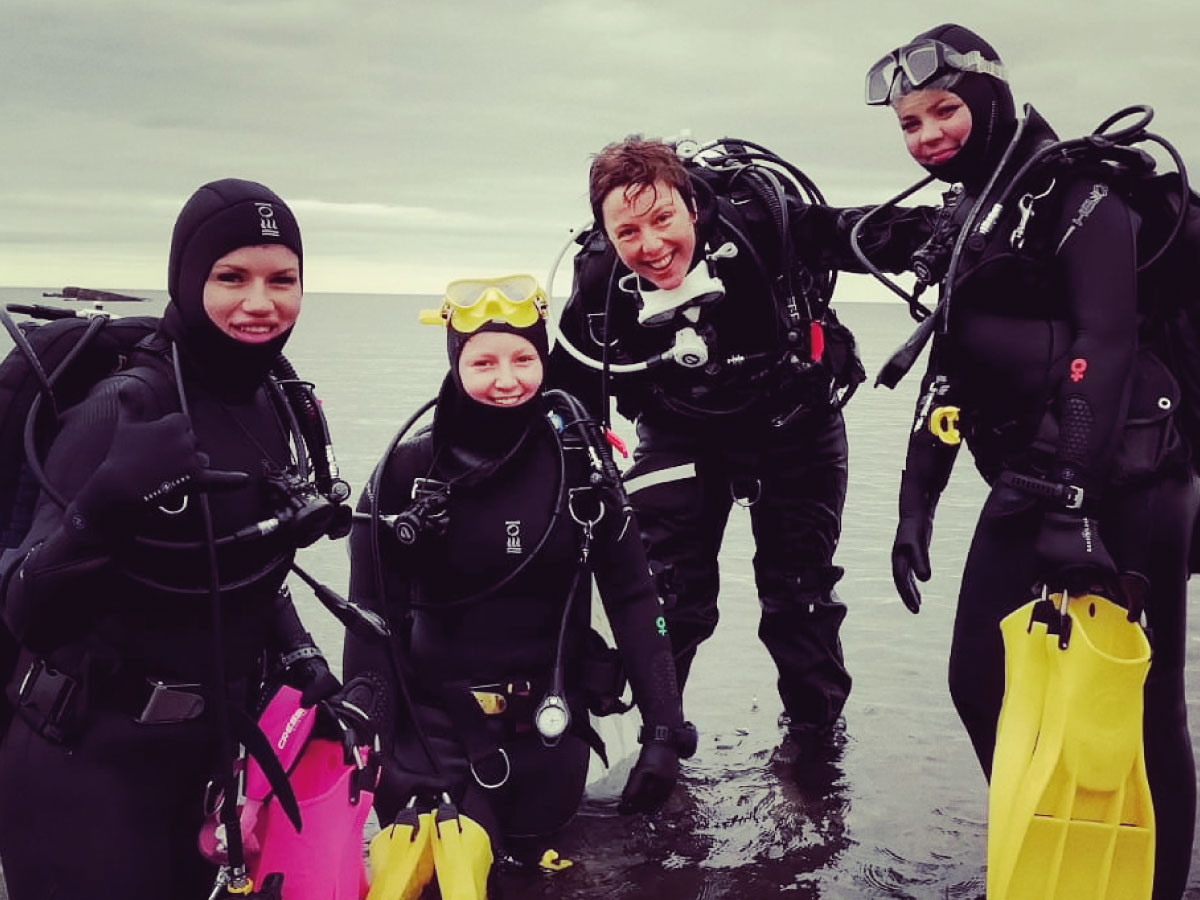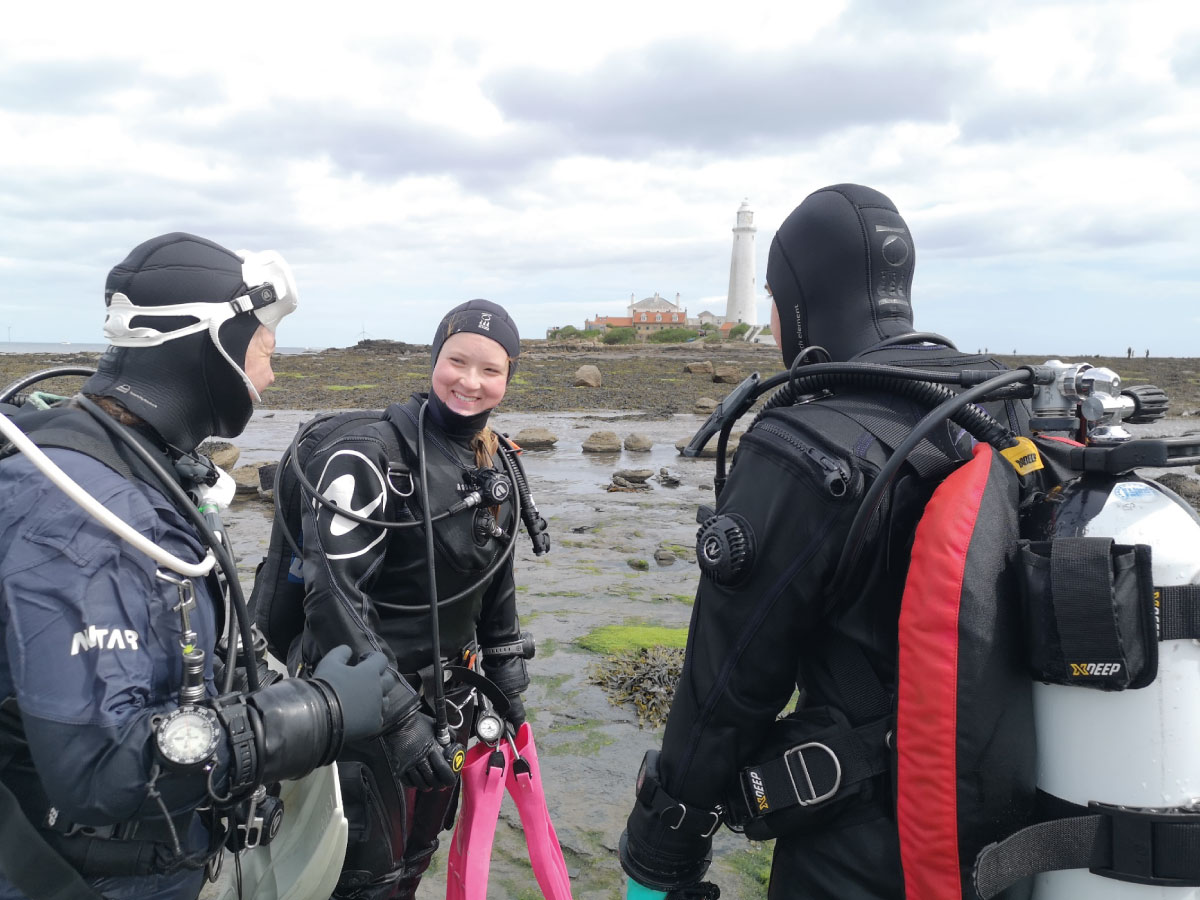HOW HUMAN FACTORS SHAPE ECO-DIVING AT THE FIFTH POINT
If you've ever wondered how things like teamwork, communication and decision-making affect the success of eco-diving projects, you're tapping into what experts call "Human Factors in Diving".
In this article, we'll break down what human factors are and why they'e crucial for safe, effective marine conservation and eco-diver training.
SITUATIONAL AWARENESS AND ECO-DIVING PRACTICES
Situational awareness is more than just knowing where you are underwater; it's about understanding the environment around you, how you interact with it, and how it can affect you.
This involves perception, comprehension, and even projection - anticipating what could happen next.
Why it matters in eco-diving
Being aware of your surroundings is essential for both safety and making eco-friendly choices. For example, recognising a change in water movement can help you adjust your dive plan, ensuring both your safety and the well-being of the marine environment.
Eco-divers often juggle additional tasks underwater like monitoring marine life, recording data, or picking up debris. This added responsibility increases task loading, making it even more vital to maintain situational awareness for overall diving safety.
Putting it into practice
Situational awareness isn't just theoretical; it's practical. During your dives, we encourage divers to be vigilant and proactive.
But the learning doesn't stop when the dive is over. We value debriefs and feedback as essential tools for continuous improvement, Whether it's discussing what went well on a dive, or identifying areas for growth, these sessions help everyone refine their situational awareness skills for future dives.
And we really do mean everyone. Your instructors and divemasters will talk openly about any mistakes they made during their dive. They'll go over things they thought they did well. They'll ask you for feedback. Doing this kind of debrief helps everyone learn.

Our team of eco-divers showcasing effective teamwork in diving, all smiles after a successful marine conservation dive
EFFECTIVE TEAMWORK IN CLEANUP DIVES
Teamwork is the backbone of any successful dive, but it's even more important when the mission involves marine conservation.
At The Fifth Point, we believe that a well-coordinated team can accomplish way more during a dive. We can make a lasting impact on the ocean.
Teamwork makes the dream work
When divers work together, they can cover more ground, collect more data, and remove more litter than they could individually. It's not just about dividing tasks, it's about multiplying impact. A cohesive team can identify issues, solve problems and implement solutions more efficiently.
Role clarity
When you become an eco-diver at The Fifth Point, you become a member of an awesome team led by our experienced divemasters and instructors. They will take care of the logistics so you won't need to worry about navigating or dive planning at first.
This allows you to concentrate on your specific role within the dive, whether that's monitoring marine life, collecting debris, or videoing grey seals. Knowing your role prevents confusion and enhances team performance, while our pro team handles the bigger picture.
Learning from each other
As you become more experienced, you will naturally take on more responsibility within the team. You'll learn from everyone around you, and the more dives you do, the more experience you will gain. Perhaps you will even rise through the ranks and become a divemaster or instructor yourself!
Trust: the foundation of teamwork
Trust is possibly the most important element of teamwork, It needs to be built over time, and it 's the glue that holds the team together.
The Fifth Point team of pros and eco-divers are very open and honest. We foster an atmosphere of psychological safety and we operate a just culture.
COMMUNICATION FOR MARINE CONSERVATION AND DIVING
Effective communication is the linchpin of both safe diving and successful marine conservation efforts.
Setting the scene with a briefing
Before each dive, we conduct thorough briefings to set expectations and outline objectives. This ensures that everyone is on the same page.
Underwater signals: a shared language
Once underwater, verbal communication is replaced by hand signals. It's crucial that every diver understands these signals to ensure both safety and the success of any conservation tasks,
Please challenge things!
We encourage our eco-divers to speak up and challenge decisions if they believe there's a safer or more effective way to achieve our goals. We try to break down the authority gradient - your instructors and divemasters are not gods or gurus. We're just normal humans, divers just like you. We make mistakes, we make wrong decisions, and we want you to help us learn!
PSYCHOLOGICAL SAFETY IN ECO-DIVING
At The Fifth Point, we prioritise psychological safety in diving just as much as we do with gear checks and dive plans. Why? Because a team that feels safe is a team that communicates, collaborates and ultimately works together on conservation projects the best!
We've created an environment where everyone feels comfortable speaking up, asking questions, and even challenging the status quo. Here, no question is considered "stupid", and you won't be judged for wanting to understand something better. We believe that a well-informed diver is a safer, and more confident diver, and that starts with feeling free to ask questions.

A candid moment captured during a debrief, highlighting the psychological safety in diving practices at The Fifth Point.
HUMAN FACTORS IN ECO DIVING TRAINING
We're committed to creating well-rounded, eco-conscious divers That's why all new divers, whether they're enrolled in the Open Water Course or our signature Marine Biology Dive Training, are required to take the Human Factors in Diving Essentials class.
This course from The Human Diver lays the foundations for understanding more about the human factors we've discussed so far in this blog.
All of the members in Submerge, our army of eco-divers have also taken this training. We believe that an understanding of human factors in diving is essential for anyone looking to dive deeper into marine conservation.
By incorporating human factors training into our teams, we're not just teaching you how to dive, we're preparing you to be a responsible steward of the ocean.
CONCLUSION: THE HUMAN ELEMENT IN ECO-DIVING
When it comes to diving, it's easy to focus solely on the technical aspects - the gear, learning skills, and safety protocols. But at The Fifth Point, we believe that human factors are just as critical. From decision-making and situational awareness to effective teamwork and open communication, understanding human factors in diving will be a game changer to both your diving experience and your impact on marine conservation.
By incorporating human factors into our training and eco-diving practices, we're not just aiming for safer dives; we're building a team of eco-divers who excel underwater.
And that, dear eco-diver, is how we make waves in marine conservation,
READY TO DIVE DEEPER?
If you're as passionate about diving and marine conservation as we are, there's no better time to take the plunge. Join us at The Fifth Point for our next dive, enroll in one of our specialised training programs, or become a part of our Submerge community. Let's make a tangible difference, one dive at a time.